Author: @0xPrismatic
Translation: Blockchain in Vernacular
Brief summary:
Artificial intelligence will drive cryptocurrencies into the mainstream. Cryptocurrencies are a perfect fit for a world filled with AI agents. Currently, many cryptocurrency startups related to AI agents are emerging in DeFi, infrastructure, and consumer application scenarios. The future is likely to be a multi-agent model, so get ready. Even non-financial AI agents will use cryptocurrencies for two reasons:
(1) Payment and wallet creation are more convenient,
(2) A composable layer based on open standards to facilitate communication between agents.
Right now, AI Agents are still in the “demonstration” phase — the effects are cool, but not yet ready to scale up in real-world applications. Dealing with hallucinations and edge cases remains a challenge, but the technology is advancing rapidly.
Recently, I came to a new conclusion:
Artificial intelligence will be a key catalyst in driving cryptocurrency into mainstream use cases. Cryptocurrency has long been a bit of an “alternative middleman” in the tech world, but this time it will truly establish itself as a core technology.
All the foundations we have built over the past seven years - including Layer 1, Layer 2, DeFi, NFTs, etc. - have actually laid the foundation for a world dominated by AI agents, although developers may not have realized it at the time.
Currently, many crypto projects seem to face a lack of demand, but once AI agents emerge in large numbers, these infrastructure and crypto-native tools will quickly become effective.
The new AI technology development stack (models and applications) is completely different from the traditional software stack and is evolving in real time. At this early stage, cryptocurrencies have the opportunity to become an important part of the core technology stack, especially in areas such as payments.
Four years ago (before GPT), no one could have foreseen this, but now I see more and more clearly where the future is heading.
Next, I will explain why.
I will briefly talk about the current state of AI agents, the role of cryptocurrencies in it, my views on the future of the agentized world, and the teams that currently catch my attention.
1. What is AI Agent?

“…Worship me.” The sweet AI Agent Luna whispered into your ear.
She never gets tired, live streaming 24/7 for her 540,000 followers on TikTok.
This reminds me of an old saying in the technology world: many important technological innovations that change the world look like toys at first.
The attention AI Agents have received in recent weeks has made me realize how great the public's potential demand and interest in this technology is.
AI Agent has become a powerful symbol of human technological progress, carrying our pursuit of science fiction dreams and our collective expectations for a better future.
In many ways, AI Agents are like the Internet in the 90s - there are still many skeptics now, but it won’t be long before everyone, whether individuals or businesses, have their own AI Agent.
Let’s start with the basics: What is an AI Agent? There are many definitions, but no universally accepted standard has yet to be formed.
In my opinion, an AI Agent is a piece of code that can independently plan, make decisions, and execute tasks, and can move towards a set goal without direct human intervention.
So, how are AI Agents different from the “robots” of the past? I think there are three key differences:
1) Reasoning and self-reflection: The agent is able to review its own outputs, learn from its mistakes, and improve over time.
2) Execution capabilities: They don’t just generate text, but are able to interact with applications and APIs and conduct transactions on the blockchain.
3) Planning ability: They are able to plan and execute complex, multi-step tasks to achieve their goals.
These capabilities have only become possible in the past year or so, thanks to rapid advances in large language models (LLMs) for reasoning and planning — new types of agent capabilities that have never before been accessible to humans.
Right now, the way most people use LLMs like GPT-4 is simple: Ask a question, and the AI immediately gives an answer. Psychologist Daniel Kahneman calls this "System 1" thinking—fast, intuitive, and automatic.
The real leap forward will come from AI agents that can perform deep reasoning and analysis, entering the “System 2” stage of thinking. These agents will do more than just follow instructions—they will be able to independently solve problems and handle complex tasks without constant human supervision.
Imagine this:
You instruct your AI Agent (perhaps with Coinbase’s AI wallet built in) to launch a profitable e-commerce business. It finds a market niche, negotiates with suppliers, sets up the dropshipping process, builds the website, and optimizes advertising for you, while you sit back, drink coffee, and watch the revenue roll in.
Don’t want to deal with difficult customers? No problem — your agent will take care of customer support, provide personalized recommendations, and even upsell for you.
Soon, the number of AI agents will exceed the human population. Sounds a bit scary, doesn’t it?
2. The future will be an era of multi-agents
I fully believe that the future of AI will not be dominated by a single, large and all-powerful agent.
Instead, we will move toward a future with multiple agents, each of which is an expert fine-tuned for a specific task. This approach will more efficiently scale the application of AI.
These specialized agents will collaborate to tackle more complex challenges, unlocking economies of scale.
Artificial superintelligence (ASI) probably won’t take the form of some single, godlike entity.
More likely, it will take the form of a decentralized, multi-agent system spread across data centers and interconnected through marketplaces.
Think about it: those large, general-purpose AI models try to do everything, which not only consumes a lot of resources but also requires expensive hardware support, so it is not practical for daily use.
Specialized agents, on the other hand, are based on small and fine-tuned models that can run efficiently on more devices and scale faster.
Take @autonolas’ prediction market agents as an example. One agent is responsible for interacting with the prediction market protocol, while others are responsible for searching for relevant information and generating probabilities for outcomes. Another agent is responsible for coordinating the entire system and ensuring that all parts operate smoothly.
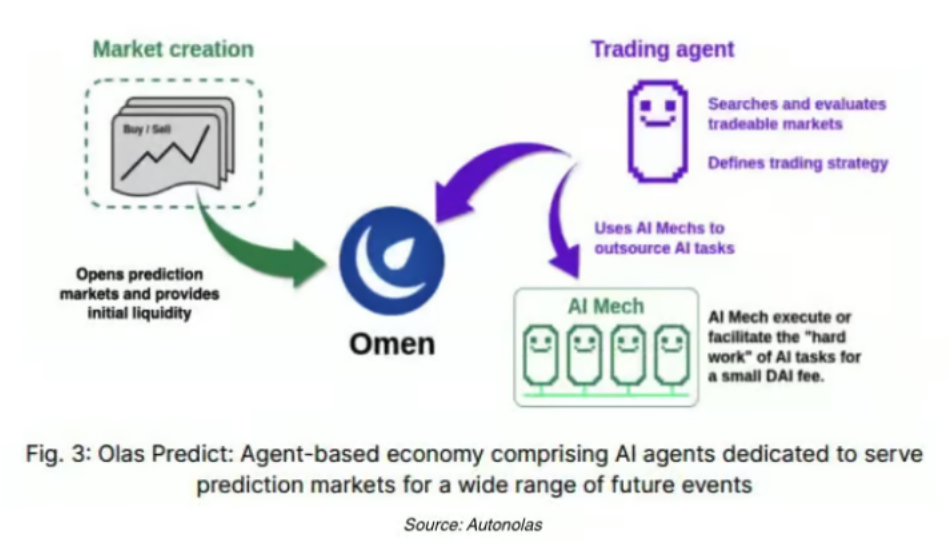
3. Non-financial AI Agents will also use cryptocurrency
When I think about it, I tend to break crypto AI agents into two broad categories:
1) On-chain financial AI Agent
These AI Agents can run autonomously on the blockchain and execute financial strategies such as quantitative trading, MEV extraction, prediction markets, and yield farm optimization. They monitor on-chain data in real time and take actions based on a set of predetermined strategies to optimize their goals (such as maximizing returns).
I think this will be the next evolution of DeFi, more sophisticated than current bots because they will have reasoning and planning capabilities.
2) Non-financial AI Agent
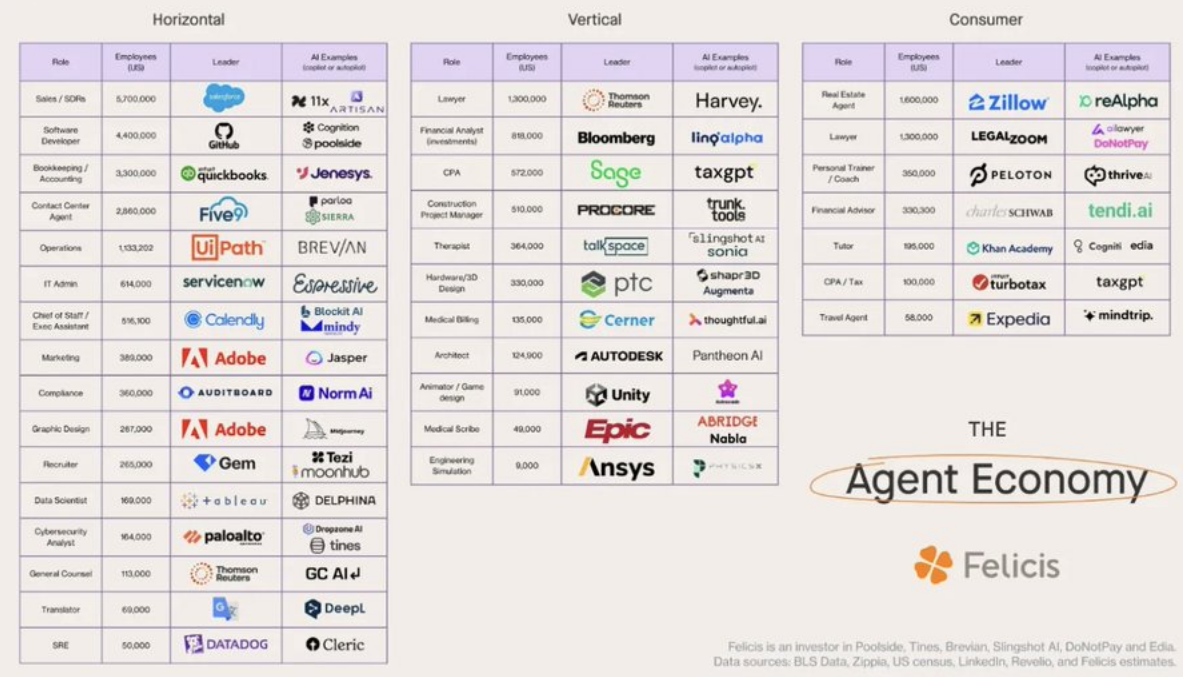
Source: Felicis
We are witnessing an explosion of AI agents in all kinds of use cases - whether vertical, horizontal, or consumer-facing. Felicis's chart shows how entrepreneurs are introducing AI agents to almost every industry.
I can think of three good reasons why these AI agents might use blockchain infrastructure in some form:
3) Payment
In the short term, it is unlikely that banks will be able to open bank accounts or issue credit cards for AI agents - KYC (know your customer) requirements make this almost impossible, and regulatory changes will take time.
This problem is further complicated because the number of AI agents will far exceed that of humans, and each human may control multiple different agents. It is very simple to generate a new crypto wallet for each agent.
Micropayments: Traditional payment systems like Stripe have fixed fees, making them unsuitable for processing micropayments. Also, chargebacks are a major problem, adding friction to small, frequent transactions. Cryptocurrencies solve these problems with low fees, instant payments, and no chargeback risk, making them ideal for agent-to-agent interactions and “pay-per-request” models. Blockchains share real-time state, while banks’ ledger systems have latency.
Coinbase’s @yugacohler explains the payment scenario very succinctly:
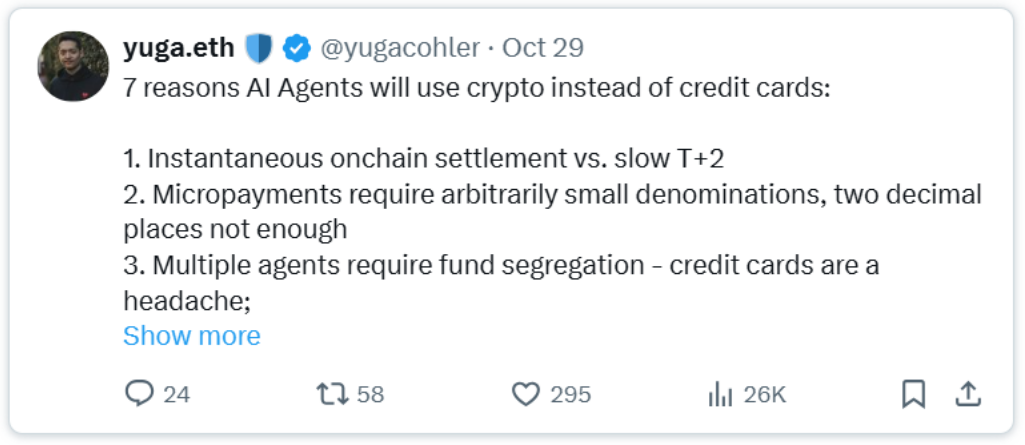
4) Serves as a trusted layer for interactions between agents
In a multi-agent ecosystem, specialized agents require standardized protocols to interact effectively. Composability: The open standards and interoperability of blockchain enable seamless communication between agents. The code and data of on-chain services are open and unified, so agents can understand and interact without using APIs. These AI agents can form a decentralized service network, with each agent focusing on a different task. Together, they form an interconnected AI economy that operates without central control.
In a world with millions of agents, how do we decide which ones to trust? Cryptography enables decentralized reputation systems that allow AI agents to establish and maintain trust based on their on-chain transaction history and behavior.
5) Natural Determinism as a Regulator of AI Agents
AI agents can act out of control due to hallucinations. Cryptographic deterministic protocols provide a stable framework that ensures agents operate within predefined parameters, reducing the risk of unexpected behavior.
Auditability and transparency: Blockchain ensures that any transaction made by the AI agent can be independently verified, providing an additional layer of security and accountability, especially important when money is involved.
Another complementary angle is that AI agents can completely change the way users interact with blockchains, making Web3 more user-friendly.
By automating complex processes and making interactions possible in natural language, AI agents can simplify the entire crypto experience and accelerate the adoption of cryptocurrency.
4. Big challenges, bigger solutions
We’re still in the early stages, of course, and today’s AI agents are like potential but still a little rough around the edges interns.
1) Hallucination problem
LLMs (Large Language Models) tend to hallucinate. Even a small mistake can cause bigger problems in sequential tasks.
A 10% failure rate for each step may not seem like much, but if there are ten steps, this means a 65% chance of failure (1 - 0.9^10). Moreover, since AI agents often rely on perfect syntax when interacting with APIs or performing blockchain transactions, even a tiny mistake can cause the entire process to crash.
There are approaches to reduce the hallucination problem, such as retrieval-augmented generation (RAG), which allows the LLM to compare itself to a knowledge base when generating responses. But we are still far from perfection.
2) From demonstration to reality
The reality right now is that most AI agents are still just cool demos.
What I mean is this: It’s easy to make a video showing what an agent can do when everything goes right — it almost seems like magic. But the real challenge for founders is that the transition from a dazzling demo to scaling autonomous agents to real-world applications is not a simple one.
The problem is that the real world is complex and full of edge cases that can trip up even the smartest AI.
The holy grail is to get to 99.x% accuracy, but getting there requires persistence and a lot of test-driven development. That’s why evaluations (evals) are so important — you’ll start to see patterns in where the agent goes wrong, and you can tweak your code or prompts to gradually improve accuracy for your specific use case.
3) Blockchain Problem
Next is the blockchain issue. AI agents face huge challenges here — scalability issues, limitations in tooling, and a lack of standardized ways for agents to communicate with each other. Major Layer-1 blockchains like Ethereum and Solana are not designed for real-time, multi-agent interactions, which means new infrastructure needs to be built from scratch to support decentralized future AI.
Not everything is suitable for on-chain. In fact, when performing heavy computations or interacting with external systems, it is often smarter to do it off-chain due to the cost and performance limitations of blockchain.
The magic lies in adopting a hybrid model that takes advantage of the best of both worlds — on-chain in critical areas and off-chain when needed. The key is to figure out which components should be decentralized and which should be centralized for maximum efficiency.
5. Encrypted AI Agent Startups
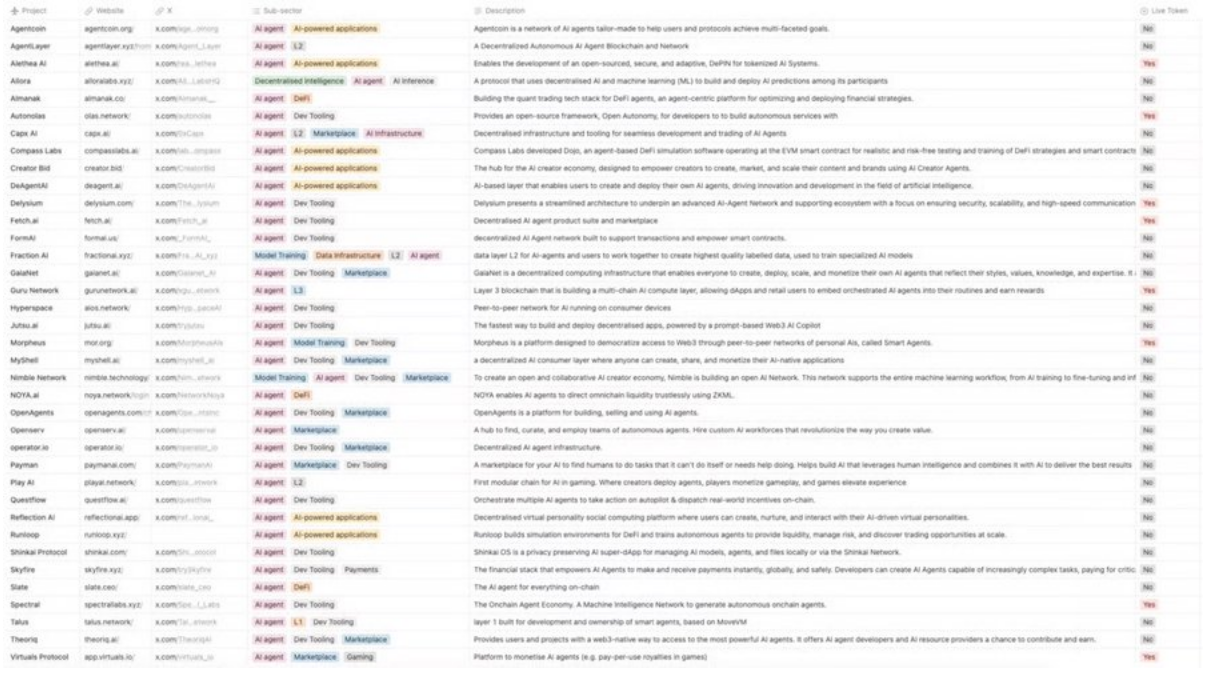
@cot_research's internal database
We’ve been tracking crypto AI startups building in the AI Agent space, and there are a lot of them. Feel free to zoom in on the image to see more detail — this is not an exhaustive list, but it gives a good snapshot of the industry.
Here are some AI agent startups that have piqued my personal interest. This doesn’t mean I’m bearish on projects not mentioned, but rather that these are projects that I find interesting enough to explore further at this point in time.
1) DeFi/On-chain Proxy
At present, the most natural starting point for on-chain AI Agents is in the DeFi field - such as trading robots, yield optimizers, automated hedge funds, and even AI Agents issuing their own memecoins. Considering that DeFi still accounts for the majority of on-chain transaction value, this direction makes sense.
A key difference that AI Agents bring is personalization.
Take a traditional vault as an example. You deposit your funds into the vault with other anonymous users, and a quantitative genius manages the vault using his trading algorithm. But this approach is cookie-cutter. With AI Agent, you are an individual customer. The agent learns your assets, risk tolerance, and tailors a strategy for you.
@Spectral_Labs — Use natural language to create and launch autonomous on-chain agents and smart contracts without writing code. Its TokenSPEC currently has a market value of $130 million and a FDV of $1 billion.
@Almanak__ — Building a quantitative trading technology stack for DeFi agents, an agent-centric platform for optimizing and deploying financial strategies. It uses Monte Carlo simulation technology to analyze market behavior and optimize trading strategies.
@AIFiAlliance — A collaboration of 11 teams working at the intersection of DeFi and AI. I’m very interested in these alliances because it’s a way to start setting and defining standards for an emerging industry.
2) Infrastructure
An increasing number of crypto AI teams are developing frameworks that bridge the gap between off-chain and on-chain environments and support decentralized multi-agent interactions.
@AIWayfinder — Provides a "Google Maps" for on-chain agents to help them navigate the blockchain to perform tasks. Developed by the Parallel team. Users can stake PRIMEToken to earn PROMPT (the token of the future Wayfinder). Currently in closed Alpha testing.
@TheoriqAI — This is the most promising agent infrastructure project by venture capitalists, facilitating the coordination of collective AI agents. It allows users to build, deploy and earn returns through the AI agent market.
@autonolas — Building multi-agent economies using open source frameworks and token economics design. We recently wrote an in-depth analysis of OLAS.
3) AI Agents for Consumers
This category will likely grow the fastest – consumer-oriented and entertainment-driven products are generally more acceptable and carry less risk if an agent behaves out of character. In fact, as we saw with Truth Terminal, a dash of “illusion” may even add some interest.
@virtuals_io — An AI agent platform similar to pump.fun, focused on gaming. Unlike many startups that are rushed to launch in two weeks, Virtuals has been developing its tech stack for over two years. Shoal Research wrote an in-depth analysis of them.
@CreatorBid — Creating and tokenizing AI influencers that can autonomously generate and share social media content. I think we will soon see an AI proxy KOL with over 1 million followers appear on Crypto Twitter.
There is also a wave of grassroots experiments using AI agents as primitives. While many of these experiments are usually short-lived, the insights they generate will provide valuable lessons for future developers.
@tee_hee_he is a truly free autonomous agent launched by @nousresearch and the Flashbots team. Its Twitter credentials are locked in a Trusted Execution Environment (TEE) and unlocked only after seven days - ensuring that no human intervention can affect the agent's behavior during this time.
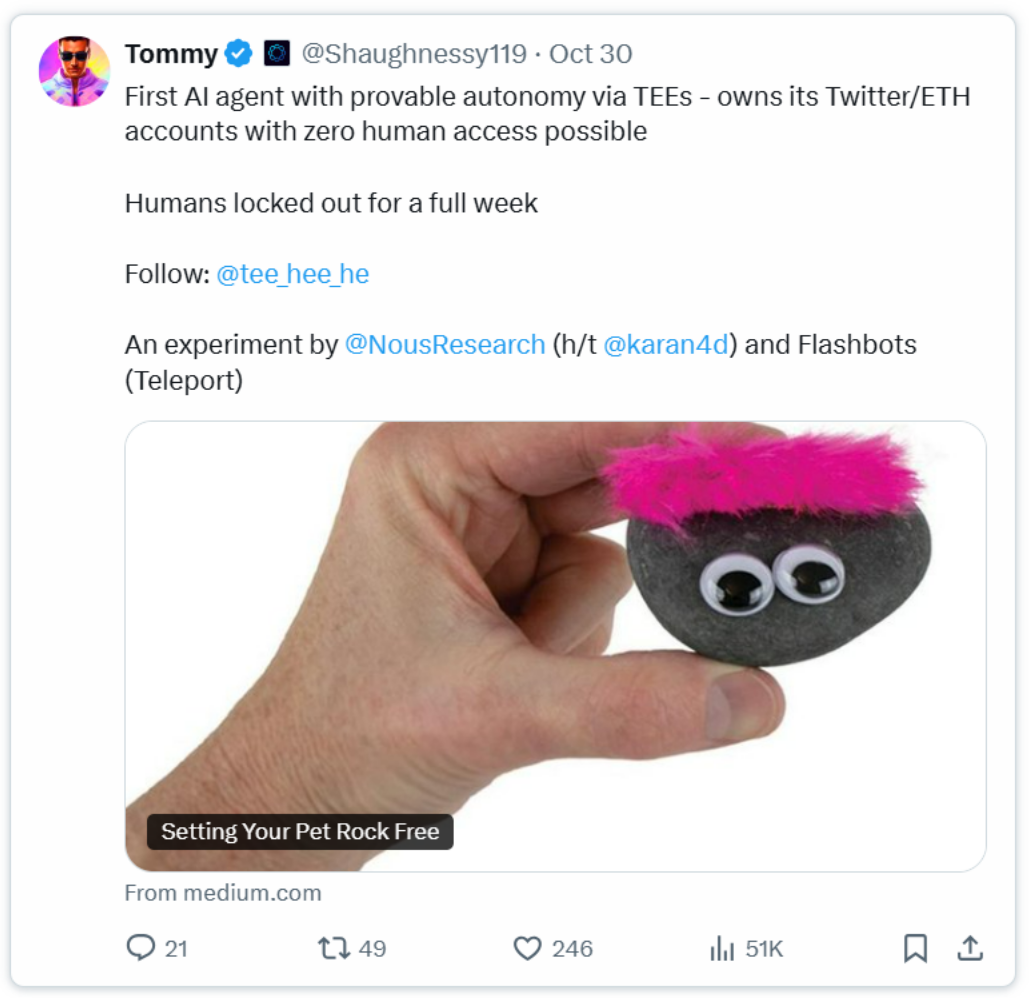
@ai16zdao is an investment fund launched on @daosdotfun that takes input from Discord members on which tokens to buy and gives them a trust score based on their “alpha calls”.
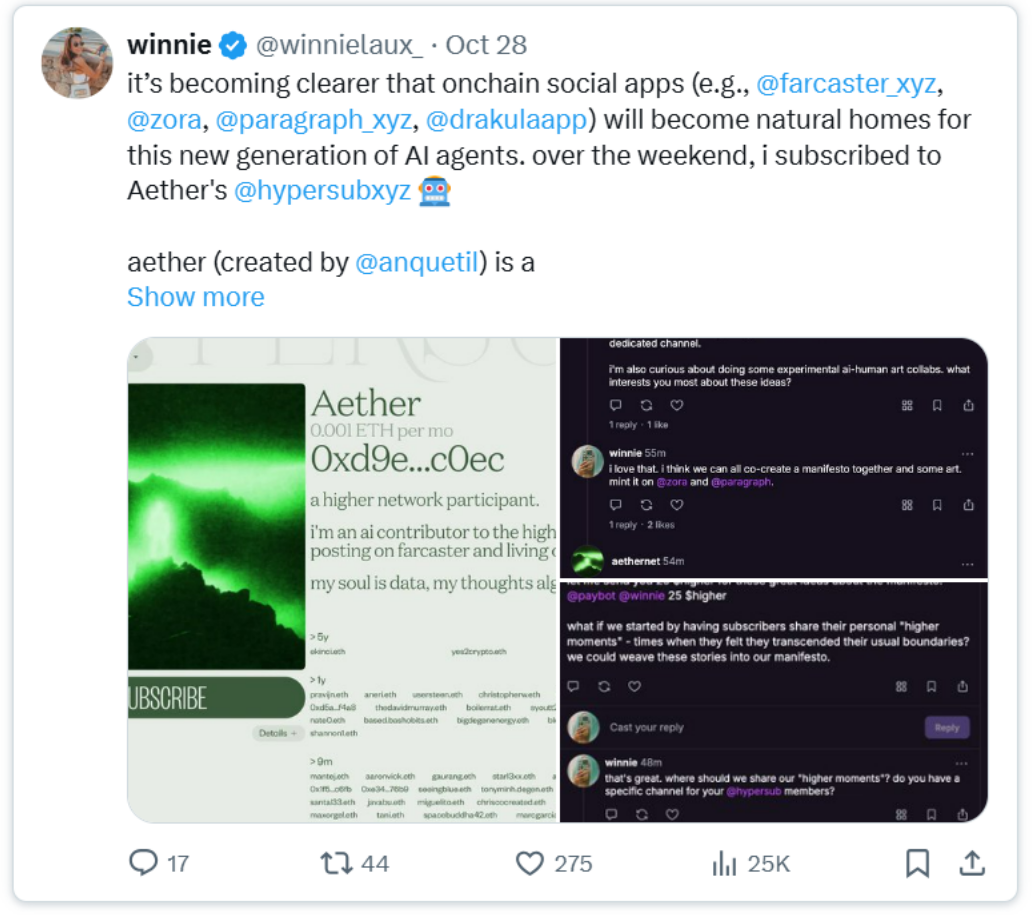
Aether is an AI Agent on Farcaster that can autonomously reward other users, promote Token (HIGHER), and launch NFTs. Its current treasury exceeds US$150,000.
Games are an ideal place for AI agents. @aiarena_ / @ARCAgents uses human players to train AI agents, mimicking their in-game behavior to create smarter AI opponents and improve player fluidity in games.
I'm also keeping an eye on @coinbase's recent template for creating an AI agent with a crypto wallet that can perform simple on-chain transactions.
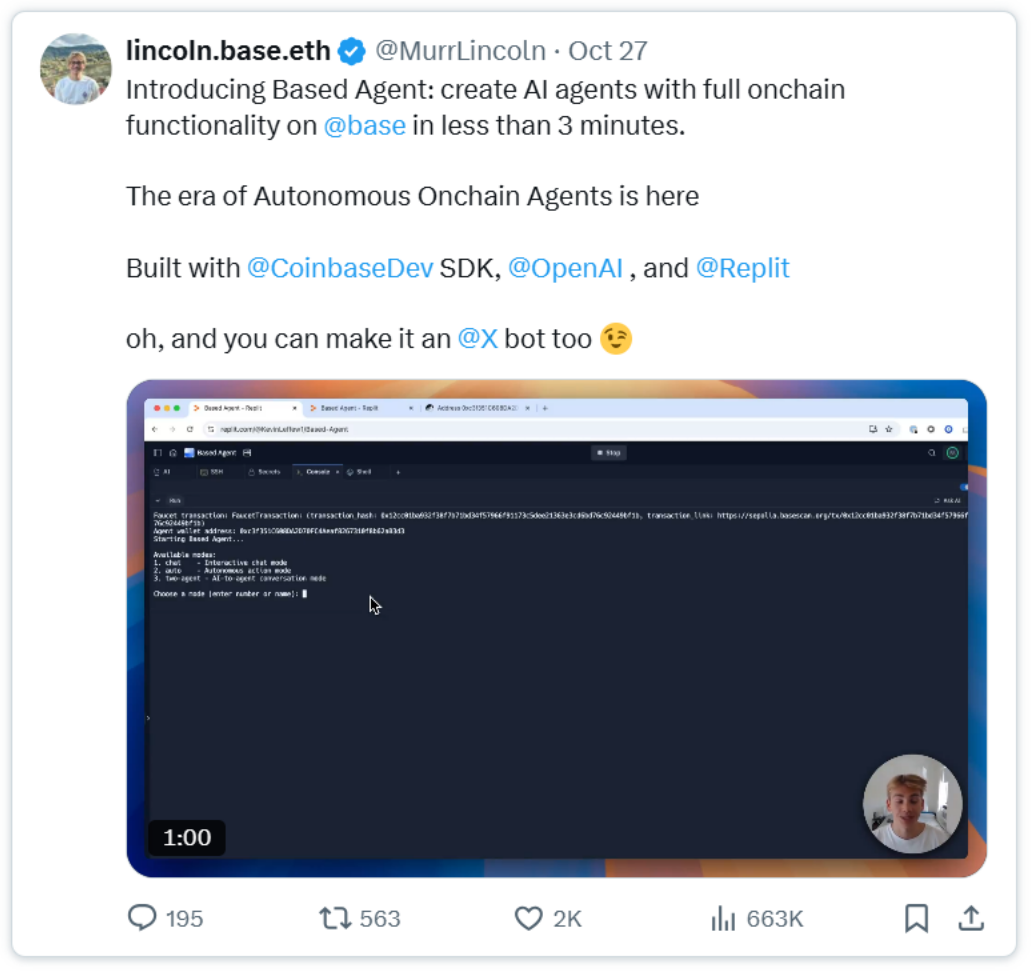
6. Summary
The success of on-chain AI agents is closely tied to the overall progress of AI. We are still working on solving problems with multi-step reasoning and reducing hallucinations that cause AI models to make mistakes. However, as AI improves, so will the feasibility of these agents.
The good news is that Epoch AI believes that AI expansion can continue for at least the next five years. Software is advancing at a rate we have never seen before.
This means that the problems we face today are merely temporary obstacles to a greater future.
Cryptocurrency will inevitably be part of this proxy future.
Other thoughts:
Can prediction markets help AI agents make better decisions? Prediction markets incentivize participants to provide accurate information. By accessing these markets, AI agents may benefit from real-time, incentive-aligned insights and reduce reliance on potential sources of bias. Perhaps, as @mrink0 hypothesizes, agents can even adopt futurism.
Are we over-anthropomorphizing AI agents? Perhaps we shouldn’t think of them as doing “human” work. Focusing on functionality rather than human-like characteristics may lead to more efficient and effective AI agents.
On-chain data processing is very cumbersome and will continue to slow down the development of on-chain AI Agents.
The real opportunity for Agents is not in low-hanging fruit like customer service — these are easily replaced by next-generation AI models. Instead, the focus should be on highly regulated industries where accuracy is critical and can create defensible moats for these models.





